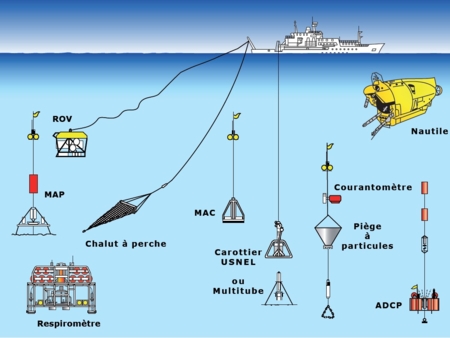Offer of a PhD Scholarship in the BEEP Unit (2022-2025) "Hydrostatic pressure control of hydrogen metabolism in hyperthermophilic Archaea from deep sea hydrothermal vents (OSIRIS)"
Ghislaine Henneke and Mohamed Jebbar from our unit BEEP offer a PhD Scholarship
Doctoral school: EDSML (https://ed-sml.doctorat-bretagneloire.fr/), the complete application file must be submitted on the thesis offer management platform (https://theses.doctorat-bretagneloire.fr/sml/theses-2022)
Summary
The strictly anaerobic hyperthermophilic archaea Thermococcales, of the Euryarchaeota phylum, conserve energy for growth by fermenting carbohydrates and peptides to CO2, H2 and organic acids (e.g., acetate) in the absence of elemental sulfur (S ), whereas in the presence of S , they reduce S to H2S rather than producing H2. Their energy conservation system is minimally composed of the respiratory membrane bound NiFe-hydrogenases (MBH), the Mrp-type Na+/H+ antiporter module, and the A1AO ATP synthase. This system, which oxidizes reduced ferredoxin (Fd) produced by fermentation, reduces protons to H2 gas, and conserves energy by creating a sodium ion gradient that is used by ATP synthase to form ATP, is undoubtedly an adaptation of hyperthermophilic archaea to high temperature environments encountered in shallow and deep-sea hydrothermal vents. Switching between metabolic modes requires a rapid transcriptional response and this is orchestrated by the sulfur response regulator SurR, one of only few transcriptional regulators known for their redox activity.
Fascinatingly, in T. barophilus, the switch between S0 and H2 metabolism orchestrated by SurR is modulated by physiologically relevant hydrostatic pressures. Transcriptomic experiments of T. barophilus have shown that genes encoding hydrogenases are over-expressed under high hydrostatic pressure (HHP) even in the presence of S0. The objective of the OSIRIS thesis project is to elucidate at the cellular and molecular level the role of SurR regulator and the way in which HHP, a major parameter of the deep sea, can modulate sulfur and hydrogen metabolisms in the biological model T. barophilus.
The originality and innovative aspect of the OSIRIS project is the combination of multiple complementary skills at the interface between physics and biology, which are contributed by the different local and international collaborators of the project. To our knowledge, this multidisciplinary PhD project, which integrates high-pressure microbiology, genetics and gene expression, highpressure protein-DNA binding, and structural approaches for a thorough analysis, explanation and insight into the high-pressure control of the redox regulator and energy conservation in extremophiles from deep sea hydrothermal vents, is a major breakthrough at international level.
Profile of the applicant (main specialty/discipline, scientific and technical skills required):
Skills in microbiology, molecular ecology:
- Knowledge of Pasteurian microbiology, cultivation of aerobic and anaerobic, thermophilic microorganisms.
- Knowledge of microbial metabolisms and microbial ecology
- Basic knowledge of molecular biology (DNA and RNA extraction, PCR, Q-PCR and RT-Q-PCR)
Skills in genomics and biochemistry: Comparative genomics, Protein biochemistry and Structural and metabolic genomics
Knowledge/skills in analytical methods will be appreciated (chromatography, fluorescence spectroscopy, mass spectrometry)
Abilities: Rigor, organization, autonomy. Ability to work in a team. Good interpersonal skills.
Language skills: English: Written and oral comprehension and expression: level 2.
Application contacts: curriculum vitae, a cover letter, a summary of the master thesis and the e-mail address of the academic researchers who can recommend the applicant must be sent to Ghislaine Henneke (Ghislaine.Henneke@ifremer.fr) and Mohamed Jebbar (mohamed.jebbar@univ-brest.fr)
Starting date 1st November, 2022







